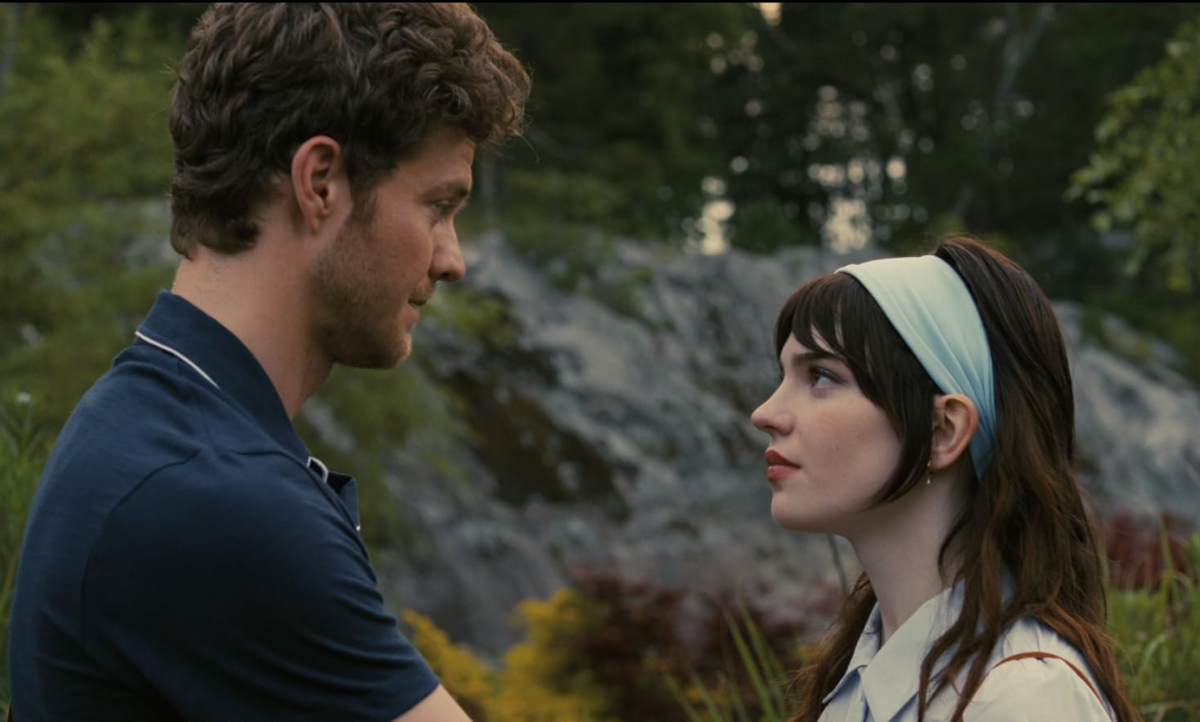
If you go into the theater expecting to watch a typical horror movie, like I did, you may find yourself either pleasantly surprised or slightly disappointed by what unfolds on the screen. Drew Hancock’s “Companion,” while undoubtedly gruesome, leans more dark comedy and psychological thriller than horror. Hancock subverts expectations, taking what seems like a story of artificial intelligence (AI) gone rogue and instead turning it into an exploration of human nature and manipulation.
The film follows Iris (Sophie Thatcher) and Josh (Jack Quaid) as they attend a weekend getaway at a cabin with Josh’s close-knit group of friends, Kat (Megan Suri), Eli (Harvey Guillén), Patrick (Lukas Gage) and Sergey (Rupert Friend). What begins as a picturesque weekend soon takes a dark turn when Iris, revealed to be an emotional companionship android, goes haywire. She harms the humans and runs into the woods surrounding the cabin. Josh and his friends set out to find her, initially attempting to shut her off, but their goals soon spiral into something sinister.
At first glance, “Companion” follows the commonly used trope of out-of-control AI, where a once-obedient machine turns against its owners. However, the film’s true horror does not come from the killer robot but from Josh himself. As the movie progresses and the curtain begins to drop, it becomes increasingly clear that Josh is not the sympathetic, loving protagonist he appears to be. Instead, he embodies the insidious nature of self-proclaimed “nice guys” who believe their hard work and kindness entitle them to more than they have received. Josh’s transformation from an ordinary man to a ruthless, manipulative villain is both terrifying and eerily plausible. Even after causing the death of all of his friends and various bystanders to serve his own greed, he tries to justify his actions, placing the blame on Iris and the world around him rather than taking responsibility for his actions.
What makes “Companion” truly compelling is its biting social commentary. It analyzes the danger of entitlement — how some individuals can twist their own perceived victimhood into a catch-all excuse for violence. Josh views himself as a good guy deserving of more than he has, but his actions prove otherwise. He embodies a terrifyingly realistic person: someone who believes their own suffering allows them to inflict suffering on others. His slow descent into irrevocable madness isn’t triggered by something supernatural or a robotic rebellion but rather by his own unchecked ego.
Thatcher’s performance as Iris is the film’s linchpin. She masterfully balances the fine line between robotic precision and human emotion. The film questions the true nature of humanity: Is it simply having human flesh, like Josh, or actually caring about the lives of others, like Iris? If a robot can feel emotions, make decisions and exert control over its actions, at what point does it stop being merely a machine? The film dances with these philosophical questions without providing any answers, leaving the audience to wrestle with the implications of artificial consciousness even after the movie ends.
Visually, “Companion” is a stunning film. The cinematography is gorgeous, with the eerie yet breathtaking forest setting providing a haunting backdrop to the mental unraveling of the characters. The film leans into pastel tones, creating a dreamy and surreal atmosphere that juxtaposes the dark thematic elements of the film. Close-ups of the characters’ faces are particularly striking, perfectly capturing the line between robotic and human. In particular, Iris’ subtle expressions switch between synthetic detachment and haunting emotion. Every frame seems carefully created to add to the themes of the film, producing a mesmerizing and unsettling experience.
The film’s blend of horror and dark comedy works surprisingly well. The gruesome, tension-filled moments are frequently accompanied by dry, satirical humor, making for an unsettlingly entertaining experience. “Companion” thrives in its ambiguity and its disturbing themes. However, while there is nothing openly bad about the film — no glaring plot holes or obvious missteps — something still feels like it is missing. The plot and dialogue, at times, falls a bit flat, lacking the depth needed to make the film truly gripping. In the end, it’s Thatcher’s and Quaid’s performances that give the film its three-dimensional quality, elevating it from something that could have been forgettable to an engaging film.
Ultimately, the film is less about killer robots and more about the horrors of unchecked narcissism and privilege. It confronts the uncomfortable truth that the greatest threats may not come from machines gaining autonomy but from privileged humans who cannot acknowledge their own monstrous tendencies. “Companion” is definitely an entertaining film with strong performances, absurd comedy and thought-provoking questions.




















